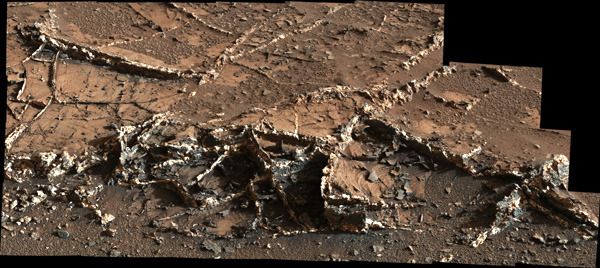
NASA / JPL - Caltech / MSSS
Curiosity Sees Prominent Mineral Veins on Mount Sharp, Mars (Press Release)
This view from the Mast Camera (Mastcam) on NASA's Curiosity Mars rover shows a network of two-tone mineral veins at an area called "Garden City" on lower Mount Sharp.
The veins combine light and dark material. The veins at this site jut to heights of up to about 2.5 inches (6 centimeters) above the surrounding rock, and their widths range up to about 1.5 inches (4 centimeters). Figure 1 includes a 30-centimeter scale bar (about 12 inches).
Mineral veins such as these form where fluids move through fractured rocks, depositing minerals in the fractures and affecting chemistry of the surrounding rock. In this case, the veins have been more resistant to erosion than the surrounding host rock.
This scene is a mosaic combining 28 images taken with Mastcam's right-eye camera, which has a telephoto lens with a focal length of 100 millimeters. The component images were taken on March 18, 2015, during the 929th Martian day, or sol, of Curiosity's work on Mars. The color has been approximately white-balanced to resemble how the scene would appear under daytime lighting conditions on Earth.
Malin Space Science Systems, San Diego, built and operates the rover's Mastcam. NASA's Jet Propulsion Laboratory, a division of the California Institute of Technology, Pasadena, manages the Mars Science Laboratory Project for NASA's Science Mission Directorate, Washington. JPL designed and built the project's Curiosity rover.
Source: NASA.Gov
****

NASA / JPL - Caltech / MSSS

No comments:
Post a Comment